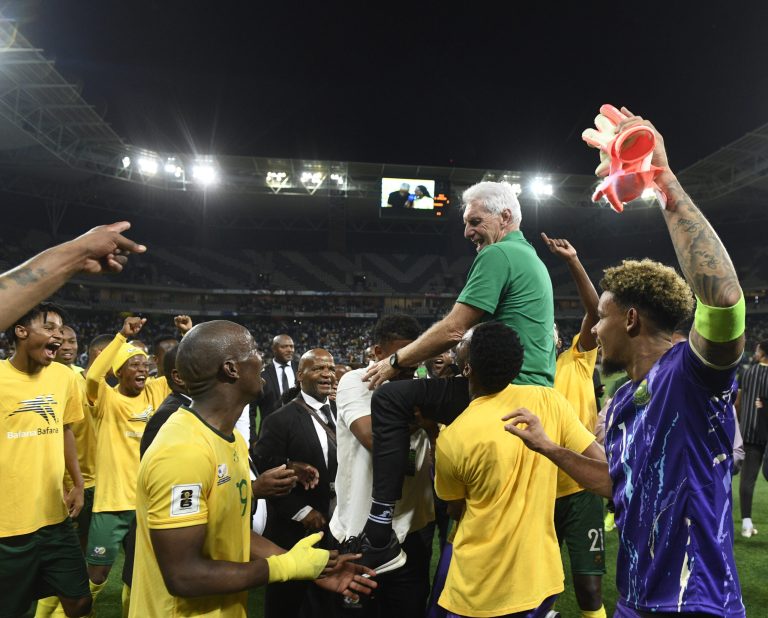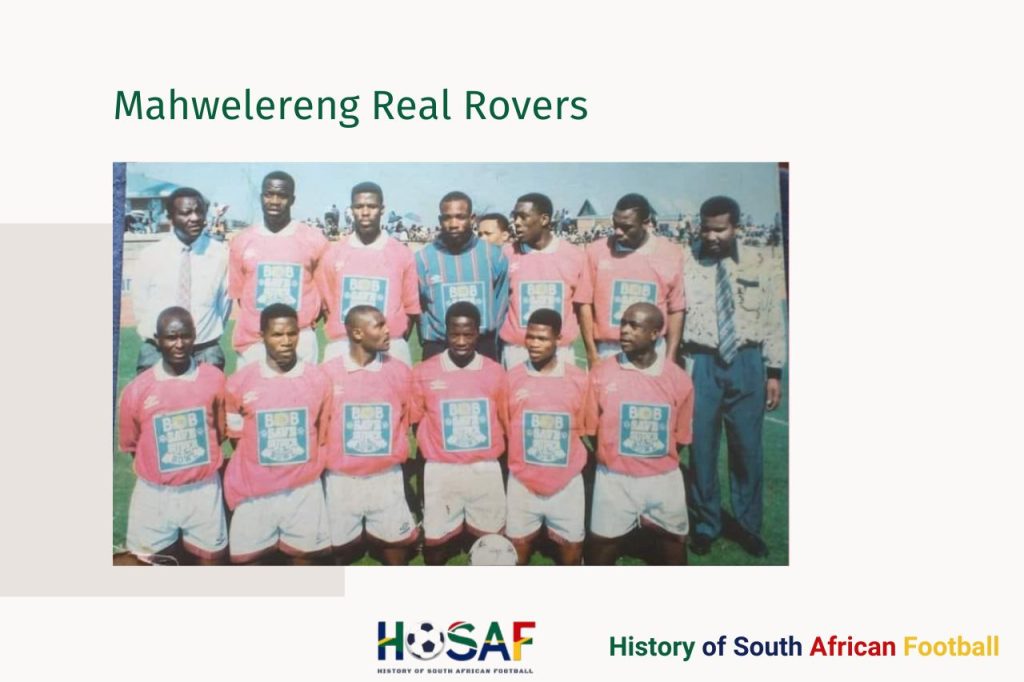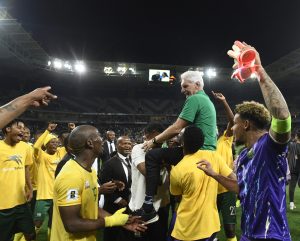Before Black Leopards, Dynamos and City Pillars carried Limpopo’s banner in the PSL, there was Mahwelereng Real Rovers — fearless, flamboyant, and fiercely local. Rising from the township of Mahwelereng near Mokopane, this club broke barriers in the 1990s, bringing top-flight football to rural communities and carving a place in South Africa’s football history. They were more than a team — they were “Thiba”, a movement of pride, rhythm, and resilience.
🟨 SECTION 2: Club Overview
Quick Facts About Mahwelereng Real Rovers
| Attribute | Details |
|---|---|
| Full Name | Mahwelereng Real Rovers Football Club |
| Nickname | Thiba (also called “Gladiators of the North”) |
| Founded | 1975 |
| Location | Mahwelereng, near Mokopane, Limpopo |
| Stadium | Mahwelereng Stadium → Peter Mokaba Stadium |
| Colors | White or Blue |
| Top-Flight Years | 1994–1999 |
| League Status | NSL / early PSL |
| Final Status | Relegated in 1998, defunct thereafter |
🟨 SECTION 3: From Township Grounds to National Stage
Real Rovers: Limpopo’s First NSL Heroes
Founded in 1975, Real Rovers became the first team from Limpopo to play in the National Soccer League (NSL), entering the top flight in 1994. They had already made waves in the OK League Second Division, twice topping the “O” Stream — although a promotion in 1992 was overturned due to fielding an improperly registered player. After regrouping in 1993, they returned stronger and clinched promotion fair and square. They proudly flew the flag for Mahwelereng, a township not previously associated with elite football.
🟨 SECTION 4: Playing Style and Support Culture
Thiba – Township Swagger, Fan-Driven Identity
- Play Style: Energetic, aggressive, and unpredictable — powered by local flair.
- Support Base: Mahwelereng, Mokopane, Polokwane, and surrounding villages.
- Fan Culture: “Thiba!” chants boomed every time they scored. The nickname came from a popular Sea Bee hit song usually played during the half-time break.
- Philosophy: Develop and showcase township-born players.
🟨 SECTION 5: Glory Years and NSL/PSL Impact
Timeline Highlights:
| Year | Milestone |
|---|---|
| 1994 | Officially promoted to NSL |
| 1995 | Finished 12th in debut season — 3rd highest scorers |
| 1996 | Improved to 9th place with consistent performances |
| 1997 | Survived first PSL season by 1 point, thrashed Wits 4–1 |
| 1998 | Relegated from PSL after poor form and financial strain |
Paragraph:
Their debut NSL season ended in style: 57 goals scored, only bettered by Cape Town Spurs and Mamelodi Sundowns. Despite limited finances, Rovers competed with heart, even beating top clubs at home. But financial burdens forced them to sell stars, and though they survived relegation in 1996/97, they finally dropped out in 1998. Without stable funding, the club slipped into semi-pro football and disappeared from the national radar.
🟨 SECTION 6: Notable Figures
Coaches:
- Walter Rautmann
- Kenny Ndlazi
Owners & Administrators:
- John “DJ” Ngobeni – founding businessman, tragically gunned down post-promotion
- Ragadi Ngobeni – sister who took over the club
- Junior Ramusi – veteran administrator
Notable Players:
- Alex “Barnes” Bapela – later played for Mamelodi Sundowns
- Andries Sebola – joined Orlando Pirates
- Gerald “Mgababa” Raphahlela – Also joined Orlando Pirates
🟨 SECTION 7: Legacy and Influence
What the Rovers Left Behind
- ✅ First Limpopo team to reach NSL top division
- ✅ Paved the way for future Limpopo clubs like Black Leopards, Dynamos, and Baroka FC
- ✅ Culturally rooted – their matches were local events, and “Thiba!” still rings in memories
- ✅ Proved township talent could compete nationally
🟨 SECTION 8: Why Real Rovers Still Matter
A Legacy Bigger Than the Trophy Cabinet
- 🟩 Limpopo’s pioneers in professional football
- 🟩 Inspired a generation of rural youth players
- 🟩 One of SA’s most loved “forgotten teams” of the 90s
- 🟩 Their rise showed football’s power to unify, uplift, and inspire
🟨 SECTION 9: The Final Whistle
Real Rovers – Gone But Not Forgotten
Mahwelereng Real Rovers were more than a football team — they were a heartbeat of hope for Limpopo. In a country still transitioning in the 1990s, they gave rural communities something to believe in. Though the club folded under pressure, their story lives on — in the memory of fans, in the careers they launched, and in every chant of “Thiba!”.


















